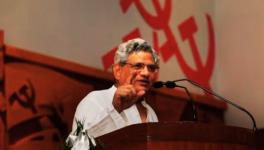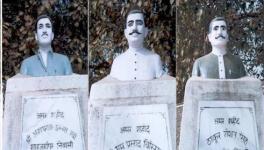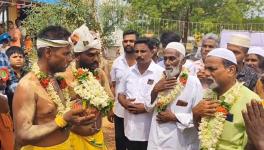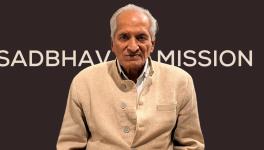Bhagat Singh’s Message is More Important than Symbols or Slogans
The legacy of Shaheed Bhagat Singh is increasingly reflected in Indian public spaces. In the numerous photographs, posters, videos and films on him, some aspects of his life are regularly telecast or put on display. Politicians are competing over claims of proximity to the inheritance of this great freedom fighter. However, as the nation pays homage to Bhagat Singh and his comrades Rajguru and Sukhdev on 23 March, it is crucial to assert that fidelity to their message is more critical than indulging in mere symbolism.
The writings of Bhagat Singh and his comrades and the statements they regularly issued make it crystal clear that they sought to establish a society free from exploitation, socio-economic inequalities and injustice. Their top priority was to quell the intolerably high injustice and exploitation of colonial rule. Put differently, the end of colonialism and freedom were their immediate goals, but Singh and his comrades were determined that the struggle against exploitation and injustice would continue even after Independence. Ending colonial rule was the only way to fulfil the goal to build a society based on justice and equality.
In this context, note that Bhagat Singh ensured that the name of the leading organisation of the revolutionary freedom fighters changed from Hindustan Republican Association (HRA) to the Hindustan Socialist Republican Association (HSRA). It was not a mere name change. Together, Bhagat Singh and his friends had a very transparent understanding of what revolution means. In practical terms, Bhagat Singh had said, it does not mean indiscriminately using violence of guns or bombs, but to end the exploitation of workers, peasants and other oppressed people.
Even the exploitation of one nation by another should end, he held. So, a wealthy minority cannot be allowed to boost the luxuries it commands while the suffering of the poor keeps growing.
Bhagat Singh described the adversities of peasants and farmers, the construction workers and weavers, under the contemporary exploitative system in great detail. They toil to contribute essential needs of society, yet they are denied even fundamental needs. This neglect is why Singh had called for a necessary change in the exploitative and unjust inequality-based system. This change, he said, has to be along socialist lines, which also resisted imperialism. The ‘Inquilab Zindabad’ slogan that Bhagat Singh and his colleagues asserted must be viewed in the broader context of their firmly-held beliefs. It is not a slogan to use frivolously.
In messages they sent to the youth, Bhagat Singh and his friends said they should not indulge in confused violence and pay more attention to working with peasants and workers to help them resist exploitation. He said they must mobilise people for durable change. The ultimate goal is peace and fraternity in the world, not based on hypocrisy but equality and justice. Bhagat Singh welcomed the notion that the world was one family but warned that it is an empty slogan so long as extreme injustice, inequality, and exploitation remain.
However, we all know that inequalities are a hallmark of our recent decades. Inequalities have grown so vast that the distance between haves and have-nots has returned to colonial levels. This is despite a steady initial decline in inequality in the immediate post-independence years. In a recent study, the World Inequality Report has recorded India’s backslide to colonial times (1858-1947). It says that the top 10% of the country then had 50% of its income, which fell, inspired by socialist policies, to 30-40%. However, the report records that liberalisation has fostered extreme income inequality all over again. The top 1% of society has benefited from reforms while the low and middle-income groups have gained slowly or fallen deeper into poverty.
So, words and symbolism are inadequate. We have to carefully and rationally examine where and to what extent India is moving away from the essential precepts of Bhagat Singh and his comrades. Citizens have to devote time to understand the reasons for the growing gulf and who is responsible for it.
Let us not forget that Bhagat Singh and his comrades had pledged themselves to communal harmony. They had a very clear grasp of how exploitative forces were creating a gulf between people and dividing them along religious lines to weaken society and the ability of people to unite against the exploiters. They actively worked against the communal campaigns in Punjab, Kanpur and Delhi despite the constraint of having to work in secrecy most of the time. But the Naujawan Bharat Sabha Bhagat Singh founded did its anti-communal work openly. He considered its work critical to attaining freedom from British rule. Communal violence or disturbances in any part of the country greatly disturbed Bhagat Singh.
Indeed, revolutionary freedom fighters before Bhagat Singh also emphasised communal harmony—the legendary friendship of Ramprasad Bismal and Ashfaqullah Khan was a powerful symbol of Hindu-Muslim unity. But his emphasis on opposing communalism took a more systemic form, away from the emotional campaigns most other undertook. This shift in focus made anti-communal campaigns an integral part of the revolutionary movement.
The communalisation of society for electoral gains has increased dramatically in recent years. So much so that dividing communities has become the primary means to gain and maintain political power. This is a complete departure from the ideas of Bhagat Singh and his comrades. It must be faced and firmly opposed.
Bhagat Singh and his colleagues won the hearts of Indians with their great sacrifice and deep commitment. This deep love and respect can be mobilised for critical tasks that will carry their legacy into the future. Unfortunately, powerful people use manipulative tactics to force the legacy of Bhagat Singh and other revolutionary freedom fighters into narrow cub-holes, which strips them of their core message. We see symbolic gestures rather than any commitment to their values and beliefs. But that is still no reason to stop communicating what Bhagat Singh and his colleagues stood for.
The writer has written extensively on the freedom movement. His recent books include When the Two Streams Met and, in Hindi, Azadi ke Deewanon ki Daastaan. The views are personal.
Get the latest reports & analysis with people's perspective on Protests, movements & deep analytical videos, discussions of the current affairs in your Telegram app. Subscribe to NewsClick's Telegram channel & get Real-Time updates on stories, as they get published on our website.
























